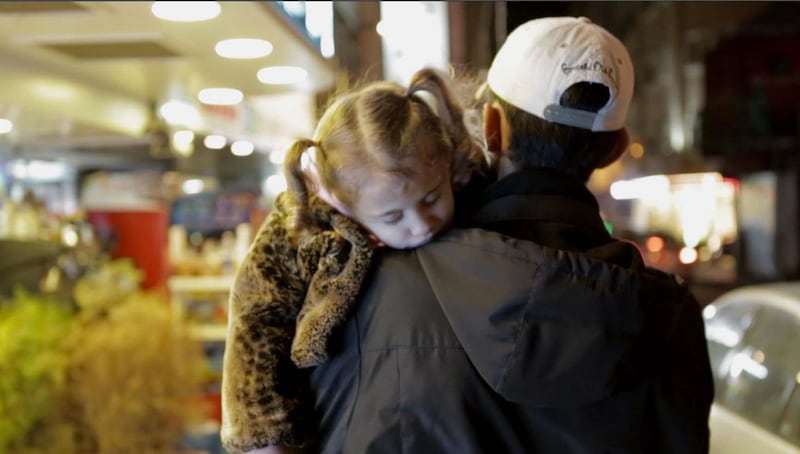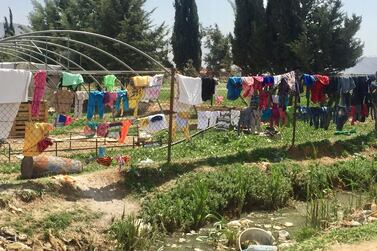The open briefcase contains documents, a ruler, pens. It's a man's work bag, but the man whose hands are wistfully handling its contents isn't currently working and might not work again.
This is the opening of Men on Hold, a documentary filmmaker Carol Mansour and producer Muna Khalidi, and this man, Abu Mohammed, is "struggling to cope with his reality", according to the shawish (headman) of the refugee camp in which Abu Mohammed now lives. An educated, middle-aged man who is respected in Syria, he fled to Lebanon with nothing and has effectively withdrawn from society. "Over there, wars are fought with guns," he says, bitterly. "Here, all sorts of weapons are used: psychological, economic, social."
It's a sentiment shared by Bashar, a gaunt, exhausted-looking Syrian refugee in Lebanon who worked as a street vendor before injuring his leg: "The way I talk to my wife, to my children, my behaviour – everything changed."
His wife, Alaa’, is tired of his constant presence in their tiny home. “I wish he’d get out more,” she says. The family go begging – disbelieving that this is what they have come to, turning their faces to the ground in shame – and Bashar feels he can talk to no one. “I have a lot of thoughts,” he says. “I reach a point where I want to leave them and die.”
Showing another side of the refugee crisis
When Mansour, a Canadian-Lebanese filmmaker with Palestinian origins, decided to make a documentary on Syrian men in Lebanon, they couldn't find much information. "Most of the aid, you know, mental, psychosocial, focuses on women and children," Mansour told The National in her office in Beirut's Hamra neighbourhood. "Nobody knows what's happening to the men. They come here and they're basically castrated."
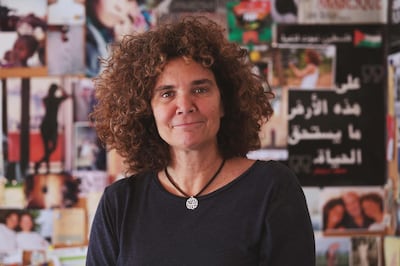
With a population estimated at six million, Lebanon has the highest refugee density in the world – 950,000 Syrians are registered with the UN refugee agency in the country. But, since the government in 2015 prevented the agency from registering any more refugees, the actual number of displaced Syrians is significantly higher.
In 2017, the UNHCR, the UN refugee agency, reported that 58 per cent of these households lived in extreme poverty (on less than $2.87 [Dh10.54] per person per day). While aid outreach focuses primarily on women and children, who are – for good reason – considered uniquely vulnerable, men, as their families’ traditional breadwinners, face particular challenges and vulnerabilities that are often overlooked and psychologically hard to bear.
Refugees in Lebanon live in tented settlements in the country’s rural hinterlands (the Lebanese government has resisted establishing official, centralised refugee camps), or rent apartments in urban areas. They are either registered with UNHCR and thus deemed by the state unable to work legally, or they remain unregistered – the UNHCR reports this is by far the majority, making up 74 per cent of Syrians aged 15 or above – and must either find work illegally or try to acquire a work permit.
Chronicling the difficulties Syrian men face
The sectors open to Syrians are tightly constrained and universally low paying: construction, agriculture, cleaning. Employers are discouraged by stringent requirements from hiring Syrians, even if few locals are willing to do these jobs for the going rate. Irregular workers have no right to benefits or social security, and most refugees are chronically underemployed. They are targets of casual racism and anti-Syrian bias, and are vulnerable to exploitation. Men on Hold wears this context lightly. "I actually try to make subjects universal," Mansour says. "War can happen wherever and anybody can find themselves a refugee."
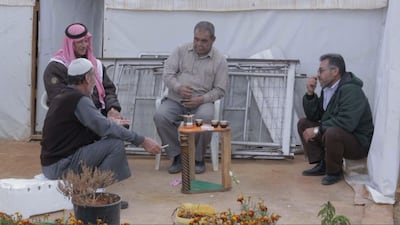
It privileges the voices of the men themselves over politicians or psychologists, and the socio-political situation is lightly sketched in sparse voice-overs. We get a three-dimensional sense of the men’s reality from the stories they recount and the snippets of their lives.
The film subtly undermines stereotypes, promoting empathy. “When we’re talking about refugees, you put on the TV and it’s numbers, it’s tents, it’s tuna cans, it’s mattresses,” Mansour says. “[With the documentary] they see, you know, that it could be me.”
This is especially so because Mansour's subjects are painfully aware of how others might see them. Chaib, a middle-aged erstwhile landowner and member of a prominent tribe, is sure that people who don't know his tribe must look at him now and think, "these people are trash". Another man, a gruff former public servant, 58, tools his motorbike around the camp but breaks down when he describes his futile struggle to find work. The somewhat delicate-looking and well-coiffed Naji, 31, describes opening his own hair salon, but shrugs off the beating he received for doing so – he'd rather talk about what he wishes he could buy for his wife.
The effect on children
In Men on Hold, although all of the men are deeply affected by their displacement, their circumstances and coping mechanisms differ greatly. While Bashar has been driven to featureless days, suicidal thoughts and irritability, Abu Khalil, 41, a father of eight, works as a part-time caretaker at a makeshift school (having formerly owned an events company) and, with wife Um Khalil pregnant and bedridden, looks after the house. "I wash the dishes, I clean the floors, I do the laundry, I cook – I do everything," he says. In his capacity as caretaker, he seems almost cheerful.
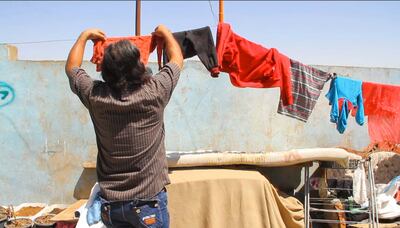
Um Khalil offers positive reinforcement. “I’m glad this is happening,” she says, eyes twinkling. “A man should feel the weight of responsibility that’s on the woman.”
None of Mansour’s subjects delve into the sensitive topic of domestic violence, and statistics are hard to find, but those working in the field say rates in this population are somewhat elevated.
Even without physical violence, the stress that refugee men experience has clear repercussions for the family. Clinical psychologist Tania Bosqui, who works with child refugees in the Bekaa, says: “The research is really clear: if parents suffer, children suffer, because the parents are the buffer between the environment and the child.”
And she believes that the notion of being the male provider and protector won’t dissipate easily.
"Even young boys feel like they need to help to provide for their family," she says. "They don't want to go to school. They want to work and make money."
